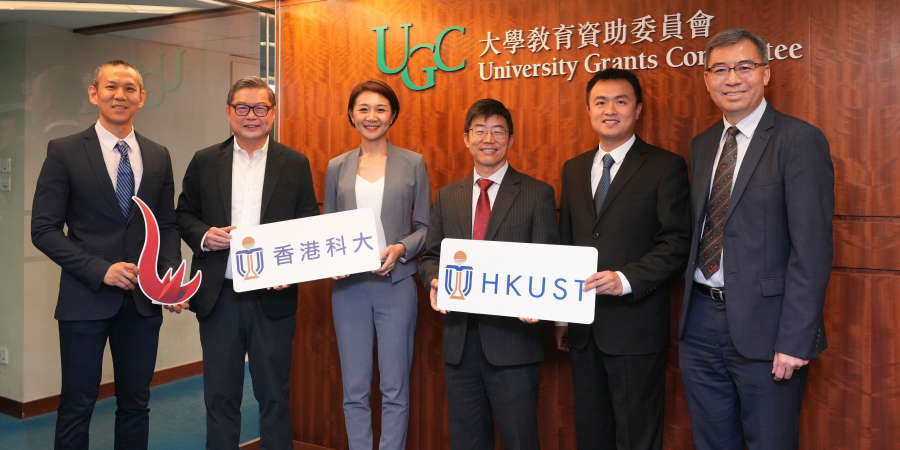Project Led by Prof. ZHANG Limin Received HK$74 Million Funding under RGC Theme-based Research Scheme
A HKUST-led project focused on scientifically managing landslide risks in the digital era was awarded HK$73.945 million* in the Theme-based Research Scheme 2023/24, a highly selective and prestigious collaborative research scheme under the Research Grants Council (RGC). The project does not only receive the largest amount of funding among the nine approved projects in the scheme this year, but also in the eight projects led by School of Engineering academics in the thirteen annual rounds of the scheme announced to date.
Titled “Digital Twin-empowered Landslide Emergency Risk Management”, the joint university-government-industry project is led by Prof. ZHANG Limin (Project Coordinator), Head and Chair Professor of Civil and Environmental Engineering, Director of Geotechnical Centrifuge Facility, and Associate Director of GREAT Smart Cities Institute. The multidisciplinary study engages experts in geotechnical engineering, construction informatics, computer science, remote sensing, hydrology, geology, transportation, emergency management, and public policy. In addition to HKUST, participating institutions comprise the Chinese University of Hong Kong (CUHK), University of Hong Kong (HKU), University of California, Berkeley, and Norwegian Geotechnical Institute.
Amid the increasing frequency and intensity of extreme rainstorms under climate change and the enduring landslide activities triggered by strong earthquakes, new landslide emergency risk management theories and technologies are urgently needed to ensure public safety and sustainable development. To address the pressing issue, Prof. Zhang’s project is set to (1) develop a digital twin of Hong Kong for sensing, simulating, and visualizing landslide hazard processes and for coordinating societal responses, and (2) create a new paradigm for managing hazard emergency risks in the digital era.
A unique city-scale physics-based, simulation-driven digital twin will be established and validated. Enhanced by this revolutionary computer graphics-based digital twin and an integrated sensing and communication network, a pioneering real-time landslide risk assessment method and novel emergency decision theory will be developed.
A project of global impact, the digital twin can be extended to manage other types of hazards (e.g. earthquakes, floods and typhoons) and crises (e.g. pandemics and transport crisis) and to hazard-prone regions worldwide such as the corridor along the Sichuan-Tibet Railway. The outcomes of the project will augment the capacity of the existing slope safety systems in Hong Kong and other regions, form a new digital paradigm for managing hazard emergency risks, and drive urban governance transformation towards smart, sustainable and resilient urban development.
In addition, Prof. LU Mengqian, Associate Professor of Civil and Environmental Engineering, is the Leading Co-Principal Investigator of another approved Theme-based Research Scheme project this year, titled “INTACT: Intelligent Tropical-storm-resilient System for Coastal Cities”, which received HK$48.293 million*.
Led by the Hong Kong Polytechnic University, this large-scale international project involves local and overseas universities (City University of Hong Kong, CUHK, HKU, HKUST, KTH Royal Institute of Technology in Sweden, and Colorado State University and the University of Notre Dame in the US), government (Hong Kong Observatory), and industry (Ove Arup & Partners Hong Kong Limited).
The project will elucidate tropical storm risk propagation in urban environments and establish an intelligent tropical-storm-resilient system to mitigate tropical storm hazards. In particular, the project will devise a framework that enables efficient and accurate assessment of turbulent flows from sparse measurements, and the quantification of urban-environment tropical storm risks arising from complex urban aerodynamics. The project team’s multidisciplinary expertise encompasses urban aerodynamics, climate modeling, wind engineering, fluid mechanics, structural engineering, and monitoring.
Both of Prof. Zhang’s and Prof. Lu’s projects belong to the theme of “Developing a Sustainable Environment”, one of the four designated research themes under the Theme-based Research Scheme.
*Includes RGC funding and matching funds from the universities involved
Related link:
- HKUST press release (July 13, 2023): HKUST Tops in Areas of Excellence and Theme-based Research Schemes 2023-24 Funding
- Theme-based Research Scheme 2023/24 (Thirteenth Round) Funding Results


